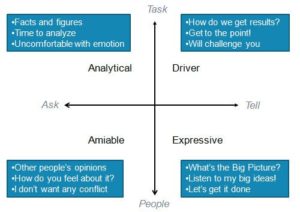
Versatility is the Key to Sales Success
Perhaps one of the best, and most underappreciated, books on the art of selling is” Versatile Selling” published by Wilson Learning Library.
Here’s how the authors explain versatile selling:
“Versatile selling is tied to communication and connection because sales don’t happen without trust and confidence between buyer and seller.”
IT’S NOT ABOUT YOUR COMFORT
Lete’s face it, selling can be an“uncomfortable” experience for most real estate agents. That’s because selling (especially at a high level) involves a tremendous amount of rejection, and most of us aren’t comfortable with rejection.
But you need to remember this simple truth: success in sales is related to making your customers comfortable. You have to learn to rise above YOUR discomfort in order to make the person on the other end of the phone feel comfortable with you. You need to keep your discomfor in check while gradually building rapport and trust with your prospect.
So, to build rapport and trust, you need to be versatile in how you approach and engage with every prospect. And an important tool in this process is understanding, and being able to adapt to, personality traits.
SELLING INVOLVES TENSION
Whether you’ve been selling for a long time or are relatively new, it’s important to understand that there are two types of tension in every sales interaction:
- Relationship tension: In the early stage of any sales enggement, prospects are naturally wary because there is not a personal connection in this phase
- Task tension: Your prospect has something to accomplish, which for us means selling a home. Depending on their life sitaution, there might be a heightened sense of urgency to sell, which can add to the tension.
Your challenge as a seller is to move a prospect away from relationship tension as quickly as possible in order to address the task at hand. This challenge puts a premium on building rapport and trust. But with regard to relationship tension, you can never relax because it can rear its head throughout the relationship. If relationship tension resurfaces, perhaps through anger or frustration, it could lead to a “fight or flight” response from your customer.
UNDERSTANDING INTERACTION
Versatile real estate agent understand relationship tension and how to modify thir approach based on knowing their customer.
The best way to know your customer is to interpret what they need and want based on observable behaviors. Let’s take a look:
Assertive Interactions
“The way in which a person is perceived as attempting to influence the thoughts and actions of others.”
Assertive types exist on a continuum. “Ask-Directed” assertive types have the following traits:
- Speak deliberately and pause frequently
- They rarely interrupt others
- Don’t tend to use voice inflections for emphasis (measured)
- Use conditional statements
- Lean back when sitting
“Tell-Directed” types, who tend to be more forward and demonstrative, cues including:
- Speak with firmness, and quickly
- Prone to interrupt others
- Use voice inflections for emphasis
- Rely on declarative statements
- When sitting, lean forward
Nobody on this assertiveness continuum has a distinct edge over anybody else, although certain levels of assertiveness can be effective. But as the seller, you have to know how to identify such behavior and modify your approach accordingly.
Responsiveness Interactions
On the flip side of the interaction model is responsiveness, defined as:
“The way in which a person is perceived as expressing feelings when relating to others.”
Again, we work on a continuum with “Task-Directed” responsivenessm on one end, displaying these observable behaviors:
- Discuss facts and tasks
- Keeps body gestures to a minimum
- Display limited range of personal feelings toward other people
- Show limited facial expressions
At the other end, we find “People-Directed” types who are sharing their feelings openly and are focused on relationship building. As such, they:
- Talk freely about relationships
- Tend to be quite expressive in their body gestures
- Display a broad range of personal feelings toward other people
- Show a wide range of facial expressions during conversations
PUTTING IT ALL TOGETHER
Versatile selling is all about identifying and adapting to a prospect’s unique social and personality styles. If you’ve ever had a DISC personal assessment, you are somewhat familiar with the four basic social types. If you aren’t familiar with DISC, we’ve outlined the basic types below. Studying these social styles can be vitally important, especially in the early stages of a sales engagement when your primary goal is to reduce relationship tension in order to build rapport and trust.
- ANALYTICS (upper left): task-directed, ask-directed
- DRIVERS (upper right): tell-directed, task-directed
- AMIABLES (lower left): ask-directed, people-directed
- EXPRESSIVES (lower right): tell-directed, people-directed

In the coming weeks, we will take a deeper dive into these various social styles in order to give you a feel for what each type of prospect expects from their interactions with you.
RECOMMENED ARTICLES
Real Estate Prospecting Automation Tips for 2025: Automate & Close More Sales
Any real estate agent knows the hustle of juggling cold…
Read MoreHow to Master Circle Prospecting: Best Tips & Strategies for Agents
How to Master Circle Prospecting: The Real Estate Agent’s Complete…
Read MoreHow to Find Pre-Foreclosure Leads
Let’s be honest: good real estate leads are getting harder…
Read More




